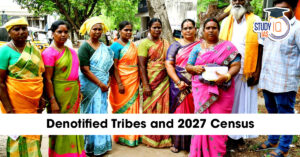Table of Contents
In a historic move towards precision healthcare and inclusive scientific advancement, Gujarat has launched India’s first Tribal Genome Sequencing Project. Implemented by the Gujarat Biotechnology Research Centre (GBRC), the initiative aims to sequence the genomes of 2,000 tribal individuals across 17 districts, marking a significant step in personalized medicine and tribal health research.
This pioneering project focuses on understanding the genetic makeup of tribal communities, particularly in relation to hereditary diseases such as sickle cell anaemia, thalassemia, cancer, and malnutrition-related conditions. It is the first state-level genome sequencing initiative in India that centers entirely on indigenous populations.

Key Highlights of the Tribal Genome Sequencing Project
| Feature | Details |
|---|---|
| Launched By | Government of Gujarat |
| Implementing Agency | Gujarat Biotechnology Research Centre (GBRC), Gandhinagar |
| Objective | Genome sequencing of 2,000 tribal individuals |
| Geographic Coverage | 17 tribal-dominated districts in Gujarat |
| Target Diseases | Sickle cell anaemia, thalassemia, cancer, malnutrition, immune disorders |
| Sample Size | 4,158 samples collected; 2,000 genomes to be sequenced |
| Technology Used | Illumina NovaSeq 6000 (Whole Genome Sequencing) |
| Representation | 50% female participants; 378 trios (child + both biological parents) |
Objectives of the Project
The main goal of this genome sequencing project is to:
-
Detect genetic markers that contribute to serious health conditions among tribal populations.
-
Build a reference genome database specific to Gujarat’s tribal communities.
-
Promote personalized healthcare by linking genetic traits with tailored treatment strategies.
-
Enable early diagnosis and preventive interventions for hereditary diseases.
-
Improve the reach of precision medicine in underserved and marginalized populations.
Scientific Approach
The process involves:
-
Sample Collection: Over 4,000 samples were collected (blood and stool), including physical data, medical history, and genealogy.
-
Trio-based Sequencing: Approximately 378 trios will be analyzed to study gene inheritance across generations.
-
Gender Equity: Ensuring 50% female participation in the study.
-
Selection Criteria: Healthy adults (18+) with no visible blood-related disorders.
Using advanced technology like the Illumina NovaSeq 6000, GBRC plans to sequence around 50 to 100 genomes per week, ensuring efficient and high-quality genetic analysis.
Data Privacy & Ethical Standards
Data confidentiality and ethics are central to the project:
-
Dual-Layer Encryption: Applied at both physical and sequencing levels to anonymize participants.
-
Consent-Based Participation: Samples collected only after informed consent from individuals and communities.
-
Secure Metadata Handling: Physical characteristics, medical data, and family histories will be protected and stored in compliance with ethical norms.
Broader Impact and National Significance
1. Pioneering Tribal Healthcare
The project will help Gujarat create tailored public health strategies for tribal populations, especially for hereditary diseases common among indigenous groups.
2. Model for Other States
Gujarat’s success could pave the way for similar state-led genomic initiatives in other tribal-heavy states like Madhya Pradesh, Chhattisgarh, Odisha, and Jharkhand.
3. Contribution to Genome India Project
Although the Genome India Project is a national-level initiative, Gujarat’s tribal sequencing program complements it by focusing on a demographically and genetically distinct segment.
4. Scientific Discovery & Research
Insights from the project can contribute to genetic research, drug development, and disease prediction models specific to India’s diverse populations.
Tribes Covered
The project includes over 20 tribal groups such as:
-
Garasia Bhil
-
Tadvi
-
Gamit
-
Rathwa
-
Sidi
-
Warli
-
Chaudhary
-
Vasava
These tribes differ in genetic lineage and lifestyle, making the genome data extremely valuable for comparative and evolutionary genetics.
Future Prospects
-
AI-Driven Health Predictions: Integrating genome data with AI can help predict disease risks and develop health alerts for tribal patients.
-
Pharmacogenomics: Understanding how tribal populations respond to drugs can help optimize medication and reduce side effects.
-
Preventive Healthcare Policies: The genome data will aid in designing screening programs, vaccination strategies, and nutrition plans based on genetic predisposition.
Conclusion
Gujarat’s Tribal Genome Sequencing Project is a trailblazing initiative that sets a national benchmark for combining genomics with tribal welfare. By focusing on genetic health markers, this project not only aims to combat hereditary diseases but also empowers marginalized communities through data-driven public health interventions. It reflects India’s growing commitment to inclusive scientific progress and targeted healthcare innovation.


 Why Iran Matters More Than Venezuela: En...
Why Iran Matters More Than Venezuela: En...
 Nuclear Deterrence in 21st Century: Is I...
Nuclear Deterrence in 21st Century: Is I...
 Denotified Tribes and 2027 Census: Deman...
Denotified Tribes and 2027 Census: Deman...

























